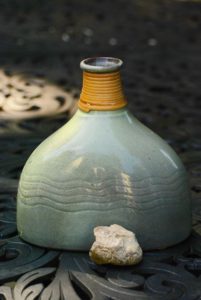The potter sits at his wheel with his ashen hands cupping a squat chunk of clay. It looks unremarkable, giving clues neither to its potential for beauty nor the obstruction hidden within.
He plunges his fingers into the center of the spinning clod and the walls of a vessel begin to rise. As it grows taller and its walls thinner, a small stone emerges, like a mole on an otherwise smooth and flawless complexion. The jar spins and spins and the stone surfaces, distorting the shape the potter is now laboring to maintain. With each revolution, it becomes ever-more lopsided until finally, it collapses onto itself. If this vessel is ever going to be beautiful and useful, that stone will have to go.
This is a story about hidden stones.
*****************************************************
The first time it happened I was kneeling at the altar with my hands outstretched to receive the Body broken for me. By the time the cup was passed, the bread I dipped in it was already wet with my tears. I was surprised, but I figured if you weren’t moved to tears every once in a while by Holy Communion, you probably weren’t paying attention.
Then it happened again and again — during holy moments when I keenly felt God’s presence, and during less transcendent ones, like the church announcements. It would rise up suddenly, like a summer squall. One minute I’d be sitting there listening to the sermon or happily passing the peace and the next, I’d be struggling to tamp down racking sobs. These were not ladylike tears that could be daintily dabbed away by a lace hankie. They were gasping, snot-nosed keening.
I had cried like this before, when grieving or in deep distress. Now, I was neither; I was just crying like I was.
The embarrassment was bad enough; to not even know what all the tears were about was excruciating. My husband pronounced it all a beautiful mystery. I was not convinced. I prayed day after day for God to make it stop. He did not.
**************************************************
I turned to the mystics, who knew a thing or two about holy tears. In fact, the desert fathers and mothers talked of the gift of tears as something to be greatly desired. They saw it as purification, a recognition of your brokenness and need of grace. Evagirus said this gift would “soften the savage hardness of your soul.” Others compared these holy tears with baptism.
My prayer changed from “Thanks, but can I return this gift?” to “Please show me what this means. Show me what you want me to see, help me to do what you want me to do.”
Months went by and nothing changed. I settled into a weary resignation about the whole affair. I continued to worship. I continued to cry. I continued to pray for revelation.
Revelation came one day through a song. While absentmindedly singing along to a favorite tune, the tears came. And for the first time, I knew why.
“I’m so sorry for things I have done,
I’m so sorry for what I’ve become
I’m so sorry for how I behaved
I’m so sorry for acting this wayIf you take me back, I promise to seek your face“
These words that I had sung so many times had finally revealed a hidden stone. More than a stone: a stumbling block in my relationship with God.
Since becoming a Christian, I had asked for God’s forgiveness for many things. But never for the years I spent mocking Him, rejecting Him, secretly accusing Him of abandoning me. True, I had left all that behind me and turned towards God. I acknowledged Him as my Creator, my Father, my Savior. But I had never asked for forgiveness for my rebellion. This small stone stood between me and God.
All at once — and finally — I saw my hidden and unconfessed sin. I asked for God’s forgiveness and in that moment, felt the mysterious burden I had been carrying for months lift. The tears left just as suddenly as they came.
*********************************************
Hidden stones. We all have them. They can be hidden sin or old wounds, disordered thoughts or unrecognized idolatry. They are invisible to us, either through familiarity or willful blindness, and it is God’s longing that we see them for what they are and how they have hindered us. And if we are to be beautiful and useful, they’ve got to go. Uncovering them and removing them is hard and often painful. And if you’re hardheaded like me, it can take a while. (I often think that for me, God’s “still small voice” just isn’t enough. With me, He has to SHOUT. )
But I also know that we can become more sensitive, softer-hearted, more attuned to what God is trying to do with us, in us and for us. I like to pray these verses from Psalm 139:
“Search me, O God, and know my heart; test me and know my thoughts. See if there is any wicked way in me, and lead me in the way everlasting.”
It is a prayer of preparation, allowing me to be formed true and straight and strong by purging my impurities.
It is a prayer for revelation, asking to see in myself what God sees in me.
It is a prayer of absolute trust in a God who wants to remove my “stones” and get on with the work of making me beautiful and useful to his purposes.

